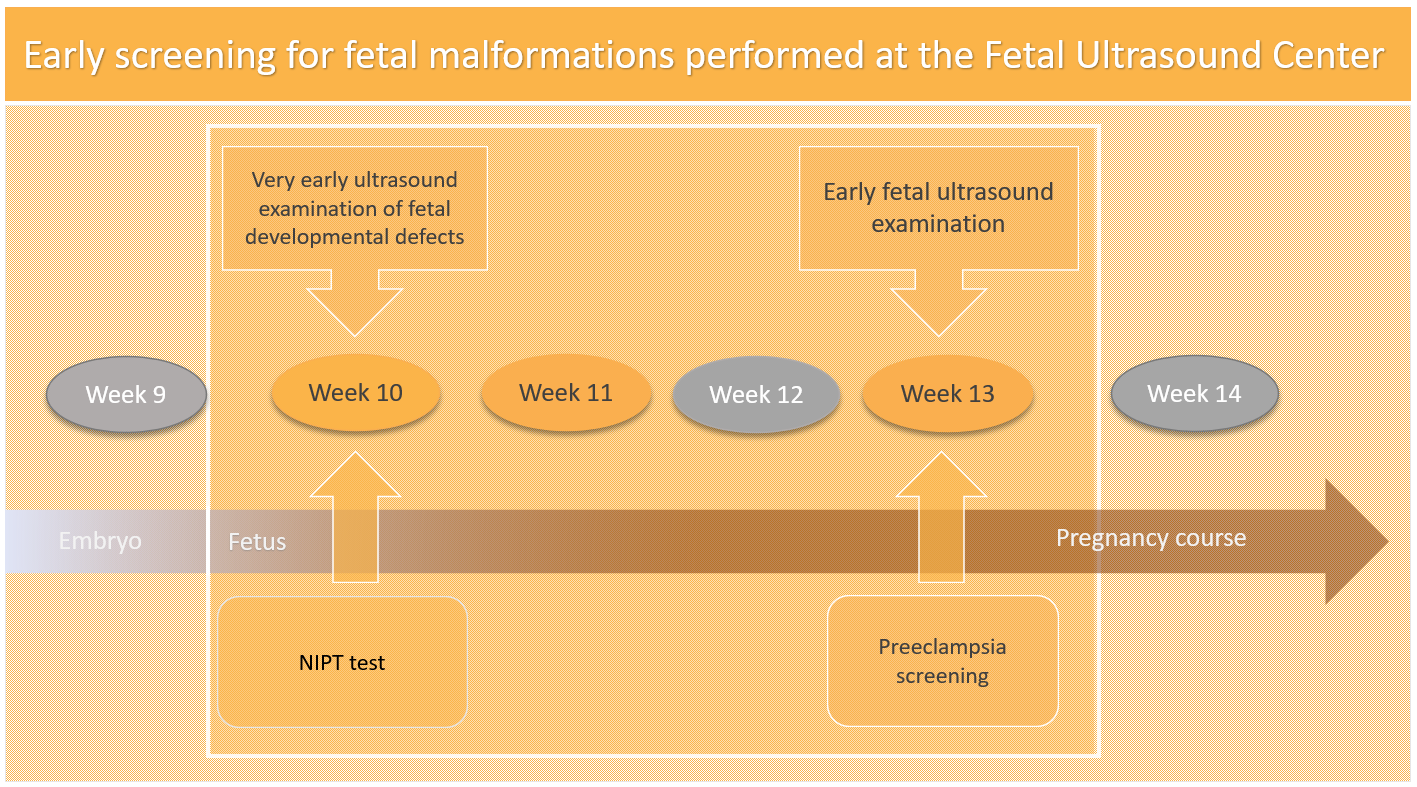OSCAR test

The first trimester combined screening or OSCAR test is performed on the 12th-14th. week of pregnancy. Early fetal malformation ultrasound with NIPT tests performed during the screening is not only the most accurate combined prenatal screening for early detection of children with chromosomal disorders, but also early to rule out 100 severe fetal malformations.
In addition to detecting fetal pathology, the OSCAR test provides an opportunity to find those women who may experience the following serious complications during pregnancy:
- Preeclampsia, during which a woman's kidney and liver function is impaired, protein enters the urine, and she develops high blood pressure, which in more severe cases can be accompanied by a life-threatening seizure syndrome.
- Intrauterine growth retardation, where the fetus does not reach its growth potential and lags behind its peers in growth. Due to the lack of food and oxygen, the gynecologist must monitor the growth and well-being of these fetuses more often with ultrasound examinations and, if necessary, induce labor prematurely if the child's well-being deteriorates.
- Premature birth, which is due to a change in the structure of the cervix, as a result of which the cervix opens imperceptibly to the woman as the pregnancy progresses, and the child is born prematurely, where he is not yet able to cope with breathing, maintaining temperature and sucking on his own.
The OSCAR test consists of a blood test and an ultrasound examination and is indicated for all pregnant women. In case of increased chromosomal risk of the fetus, we offer geneticist consultation and subsequent chorionic villus sampling in cooperation with the Tallinn genetics service of the University of Tartu Clinic.
The OSCAR test is indicated for all pregnant women, but the following will significantly benefit from this screening:
- Age ≥ 35 years;
- IVF pregnancy;
- Multiple pregnancies
- A child with a history of chromosomal disease;
- A child with a history of heart defect;
- Diabetics;
- Patients with high blood pressure;
- Obesity (BMI ≥ 30);
- History of preeclampsia or fetal growth retardation;
- History of intrauterine death of a child;
- Frequent miscarriages.
NIPT tests do not replace, under any circumstances, the OSCAR test, because NIPT tests cannot evaluate the anatomical structures of the fetus and detect developmental defects. With NIPT tests, it is also not possible to find pregnant women who may develop complications during pregnancy such as eclampsia, fetal growth retardation and premature birth.
However, there are situations where the OSCAR test is indispensable.
- If a woman is carrying triplets or in the case of a twin pregnancy, if one of the fetuses has died, it is not possible to perform NIPT tests, and the OSCAR test is the only way to assess the chromosomal risk of the fetus(es).
- If there is an increased risk of Patau syndrome, triploidy or Turner syndrome with NIPT tests, it is very important to perform the OSCAR test before offering the woman an invasive examination. The reason is that in the previously described cases, there is a very high chance that the NIPT test will give a false positive result, since the fetus is healthy, but the problem is located in the placenta.
- If the NIPT test, which is not the Panorama test, has been used to assess the chromosomal risk in the case of twins, then the OSCAR test must be performed if a high chromosomal risk is obtained, because these NIPT tests do not distinguish which of the fetuses is sick. This is important for patients who have decided on selective feticide.

